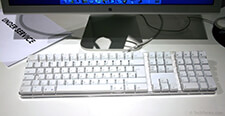QWERTY
QWERTY (pronounced "quirty") is an adjective used to describe standard Western (or Latin-based) keyboards. If you look at your keyboard, and the first six letters under the numbers are Q-W-E-R-T-Y, then you have a QWERTY keyboard.
Nearly all keyboards used in the western hemisphere have a QWERTY layout. Some countries use slightly modified versions, such as the Swedish keyboard, which includes the letters Å, Ä, and Ö and the Spanish keyboard, which contains the letters Ñ and Ç. But these keyboards still have the QWERTY characters in the upper-left corner.
History
The original QWERTY keyboard layout was developed over 150 years ago by Christopher Latham Sholes. It was popularized by the Sholes and Glidden typewriter, which was initially produced in 1867. Remington bought the rights to the typewriter and made some slight changes before mass-producing an updated version in 1974.
The only significant competitor to the QWERTY keyboard came 1932, when August Dvorak developed a new layout. His design placed all the vowels and the five most common consonants in the middle row. The goal was twofold: 1) to make the most common keys even easier to type and 2) to create an alternating rhythm between the left and right hands.
While the Dvorak keyboard may have been technically more efficient, even in the early 1900s, people were not willing to learn a new keyboard layout. The result is that the QWERTY layout has survived for over one and a half centuries. It can be found in typewriters, desktop computers, laptops, and the touchscreen devices we use today.
 Test Your Knowledge
Test Your Knowledge
